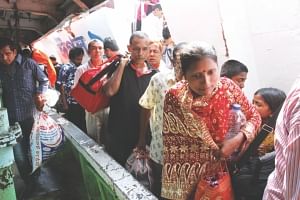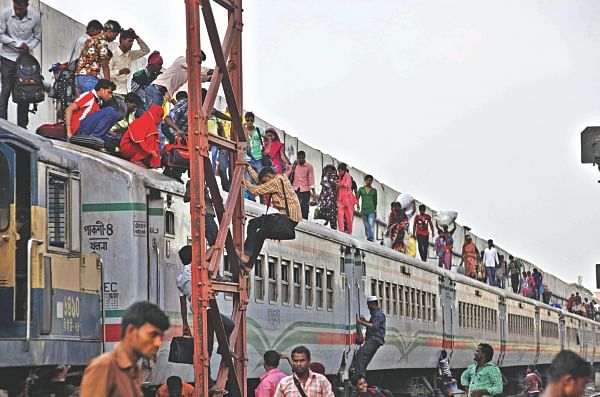| Home - Back Issues - The Team - Contact Us |
 |
| Volume 11 |Issue 44| November 09, 2012 | |
|
|
Reflections
HOMEBOUND FOR EID M Zahir Hassan Nabil
Some three days before the Eid-ul-Azha, a ferry jam-packed with vehicles was honking to leave the shore at Paturia ferryghat. Ferry driver Rashid Ali was staring over the wheels at the long queue of vehicles, those that had lost the race to get on board. For people like Rashid, Eid comes after ferrying the vehicles. “Maybe I'll take a break later and get home; who will ferry you anyway if we are gone?” He went on, as he dipped a biscuit into his tea, “For us who belong to the water, the Padma Bridge is a big concern you see. We'll have to relocate, the fruit-sellers, hawkers, tea-stalls everything.” Won't he miss this place then? Rashid smiled with typical resignation and said, "Things change, everything changes." Indeed one of the largest religious celebrations worldwide, Eid-ul-Azha has in its very core a trial for Prophet Ibrahim (pbuh) that had taught the Muslims patience, sacrifice and piety. Merely a ritual to some, this tradition has but set the cultural trajectory for many nations throughout history. It is also amazing that some events take place almost regularly centring the Eid in a particular context. For instance, in Bangladesh, there is this story of millions leaving the very centralised and densely-packed capital. Most often, the homebound take the perilous highways with potholes that look like moon craters, just to go home for Eid. The long tailbacks at ferryghats and commuters' sufferings are part and parcel of this homecoming. But the story of the homebound people is inexpressible to some extent as their sheer joy of getting home surpasses the ordeals of this arduous journey. Mariner Toufiqul Islam was getting home after a long cruise of six months on the Red Sea. He planned for his leave months ahead for keeping it in line with the Eid vacation. "Travels don't tire me at all, but the best time to get home is this Eid because everyone awaits your return, it's a double delight," he said. Ruhul Quddus and his wife were buying some jhalmuri at Kamlapur Train Station. Ruhul, a rickshaw-puller in the city, was saving to buy some land in his village. His wife, a housemaid, shares his burden. "I left my three children with their grandparents, two of them are schoolgoers," said Ruhul. "We only get to see them during the Eid as we cannot afford to leave for home more than once or twice a year." Ruhul intends to settle down in the village with his children once he saves enough. "There is no place like home," he asserted.
Not that everyone sacrifices an animal, for many it is a longing for respite, a call back home. For some Eid is far from being festive. Tofayel Hossain safeguards a six-storey building in the capital. Unfortunately, he never gets to go home during this festival as most tenants leave for their home districts keeping Tofayel and another security guard on watch. “My only priority is to get home after the tenants get back,” said Tofayel for whom Eid is just like any other ordinary day. On return, one of the tenants found his windowpane grill cut and valuables taken away, probably on the night of the festivity when everyone had retired to bed. Security issues aside, everyone was dumbfounded and seeking an answer to this most unfitting incident miring the joy of Eid. The joy of getting home also faded for Monir Hassan, a postgrad student at Jahangirnagar University, who gets home on every Eid. This time he journeyed for over 10 hours to the fringes of a southern district only to find raunchy songs, raucous dances and caricatures, organised by the local youth in the name of 'midnight cultural programme', replacing the quiet aura in his village. “I'm disappointed to find that everyone approved of such madness for this was an Eid celebration,” said a dismayed Monir whose home seemed rather unknown and unwelcoming this time. Things change, indeed. Undeniably, some experiences do not fit into the niche of the cultural trajectory the Eid-ul-Azha has been setting over the years. At times unusual experiences stem from something festive, at times the journeys do not bring the desired celebration. On the other hand, both the contentment and sufferings of homebound people are integral to Bangladeshi culture. And indeed, some homebound people in their brief relief discover the changes that have invaded their comfort zones, over time.
|
||||
|


